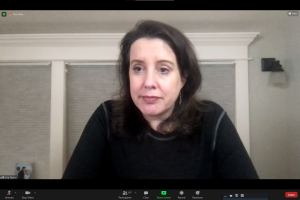We Can All Learn From Polyamory
The nine pillars of relationship anarchy provide lessons for people in any type of relationship
February 8, 2023
What comes to mind when you think of the word polyamory? Is it Mormons in Utah with at least a dozen children living in conjoined houses? Or, is it a devious, unfaithful husband who wants an excuse to cheat on his wife? Whatever it is, do you find it hard to get rid of the stigma around polyamory?
Polyamory, and ethical nonmonogamy (ENM) are practices that are becoming increasingly popular. A study published in the Journal of Sex and Marital Therapy in 2017 found that more than one-fifth of participants had engaged in some form of consensual nonmonogamy. Most people who practice ENM identify as queer, and more Generation Z people are identifying as LGBTQ+ than any other generation. It’s clear that people are tapping into nonheterosexual and nonmonogamous relationships to fulfill their emotional and physical needs.
Recently, I’ve learned more about polyamory and relationship anarchy from my queer friends, who have encountered these topics in their social circles. From going to the few lesbian bars left in New York, using dating apps and attending Pride events, some of my queer friends have been exposed to or have experienced ENM in some form. In turn, I’ve had to learn a lot about a topic that was totally unfamiliar to me before this year.
A key requirement of ENM relationships is that they are ethical: All partners must be made aware of the situation. Otherwise, it would be cheating.
Nonmonogamous relationships are not taught in schools (unless you take a very specific sociology course with a professor who challenges the idea that monogamy is the only natural form of relationships). Admittedly, I’ve struggled in the past to understand ENM and relationship anarchy, and sometimes I still do. But after doing my own research, reading about nonmonogamous peoples’ experiences and discussing these concepts in queer spaces, I’ve made a good amount of progress in my knowledge of the topic.
What Is the Difference Between Polyamory, Ethical Nonmonogamy and Relationship Anarchy?
Polyamory refers to having romantic relationships with more than one person. It falls under the umbrella of ENM, but not all ENM is polyamory. The main distinction most people use is that polyamory has to involve more than one romantic connection, while ENM refers to all nontraditional connections made between more than two people. An example of this is someone who has multiple sexual partners, but just one romantic partner. A key requirement of ENM relationships is that they are ethical: All partners must be made aware of the situation. Otherwise, it would be cheating.
First published on a blog by Andie Nordgren, which quickly gained popularity, relationship anarchy is more of a philosophy. It comprises values that encourage people to form relationships based on their own wants and needs rather than traditional social rules.
Even if you are monogamous, there is a lot to gain from rejecting what society deems as “normal” in relationships.
There is a lot of debate online about whether monogamous people can be relationship anarchists or not. Some people believe that yes, the use of relationship anarchy should not be limited to people who are nonmonogamous. However, others think that monogamous individuals should not be included, as monogamy inherently rejects the politics of relationship anarchy.
Regardless of who is included under the label, relationship anarchy provides nine important pillars that anyone can reflect on in their relationships. Even if you are monogamous, there is a lot to gain from rejecting what society deems as “normal” in relationships.
Love Is Abundant
Nordgren believes that love should not be limited between two people and that “the love felt for that person does not diminish love felt for another.” Every relationship in your life brings something different to the table. Let me clarify that when I say “relationship,” I mean all types — romantic, platonic, familial and so on.
Romantic relationships are often put on a pedestal above friendships, causing unnecessary pressure and heartbreak. Even if you do not have multiple romantic partners, you can apply the idea of abundant love to all the relationships in your life. Your love for your romantic partner should not take away from the love, connection and commitment that is also in your friendships, and vice versa. One person cannot fulfill all of your emotional and physical needs, nor should they have to. This can be something as small as your romantic partner being very supportive but unable to relate to a specific part of your life, so you call a friend about it instead. This can look like you making as much time for your friends and family as your romantic partner, or living with a friend instead of a person with whom you are romantically involved. It’s just not healthy to have your world revolve around one person.
Love and Respect Instead of Entitlement
Just because you are in a committed relationship with someone does not mean you own them or can control them. The idea of owning another person is inherently racist and misogynistic, especially in a country with a deep history of colonialism and viewing women as property through marriage.
Monogamous people can benefit from viewing their partner not as their property, but as an autonomous person who is willingly committed to loving them. Just because you are monogamous does not mean you are entitled to a person’s body, nor any other part of their existence.
Find Your Core Set of Relationship Values
Similar to love languages, people have different priorities, boundaries and expectations in relationships. Just because liking other girls’ pictures is often seen as cheating doesn’t mean you have to consider it to be cheating too. It could be to you, but take time to reflect on your answer instead of immediately giving what might be considered the socially acceptable answer. Monogamous or polygamous, romantic or platonic, the things you value most in a relationship may vary from your partner(s) and friends, so make sure to communicate that. And keep communicating it, as values can change over time.
Heterosexism Is Rampant and Out There, but Don’t Let Fear Lead You
Leading with possibility rather than fear is something that is helpful in all areas of life, not just relationships. When it comes to romantic relationships, heterosexism is rampant even among the queer community. With binary labels like “femme” and “masc” — or even the cheeky “stem” to describe a combination of both (as if most people don’t mix femininity and masculinity to their own liking) — shaking heteronormativity is easier said than done. I’ve even heard more masculine-presenting queer women complain that they’re often assumed — by other queer women — to be more dominant and require less affection just because of how they dress.
As Nordgren points out, how you combat gender norms and heteronormativity is up to you and your partner(s), but there are lots of possibilities if you’re willing to put in the effort.
As Nordgren points out, how you combat gender norms and heteronormativity is up to you and your partner(s), but there are lots of possibilities if you’re willing to put in the effort.
If At First You Don’t Succeed…
Breaking these social norms is hard work. After all, we’ve been fed heteronormative monogamy our entire lives. It takes a lot of effort to unlearn what has been forced down our throats.
It’s okay to mess up in relationships. Nordgren urges people to not beat themselves up about these mistakes when battling heterosexism, but I think this philosophy can extend to all types of faults in relationships. We’ve all let down a friend, not been able to meet all the needs of a romantic partner or misunderstood a family member. It does not mean a relationship is ruined; we can move forward and do better.
Trust Is Better
It’s a no-brainer that we need trust in relationships. ENM relationships, though, challenge people to take trust to a whole new level. Trust for nonmonogamous individuals extends beyond having faith that their partner isn’t cheating on them. They are confident that their loved ones do not wish them harm and that other relationships in their partners’ lives do not detract from what they have with their partner(s).
Talk about your boundaries, your values, your expectations and your mistakes. Discuss how you will navigate gender roles in your relationship and what monogamy means to you.
Whether they arise in romantic or platonic relationships, a lot of issues can be avoided or, at least, more easily worked through when all parties trust that their partner(s) or friends want the best for them. Once in a while, your friend might say something inconsiderate, but moments of conflict will be much tamer if you’re able to trust that they love you and do not wish to hurt your feelings.
Change Through Communication
Communication really is key! Everything mentioned on this list should be spoken about with your partner(s), even if you are both monogamous. Talk about your boundaries, your values, your expectations and your mistakes. Discuss how you will navigate gender roles in your relationship and what monogamy means to you. Learn about how your partner(s) and your friends communicate and set aside time for that communication to happen.
I’ve noticed a lot of emphasis on communication between romantic partners but less encouragement to prioritize the same level for friendships. Friendships need openness and honesty just as much as romantic relationships. So, even if you are monogamous and doing a great job communicating with your romantic partner, it’s worth considering if there’s healthy communication in your friendships too. If not, your friendships will certainly benefit from it.
Customize Your Commitments
It’s easy to characterize nonmonogamy and relationship anarchy as a refusal to commit. We sometimes see polyamory as a second choice to monogamy — a relationship falling apart and a couple resorting to adopting an open relationship. Nordgren, though, made sure to point out that this is not the case. Relationship anarchy isn’t about not committing — it’s about making commitments in whichever way you feel most comfortable.
Fairy tales and rom-coms give us an image of what the “picture-perfect” relationship looks like, but by now (I hope) we’ve all figured out that those depictions are not reality.
For example, what do you count as cheating? Monogamous and polyamorous people alike will have a wide range of answers. How committed would you like to be to your romantic partner(s)? Your friends? Your family? Would you like to move in with your romantic partner at some point, or would you rather live with your platonic partners? Or perhaps both? These are just a few of the commitments that you can decide on.
Build for the Lovely Unexpected
There are about a billion things that societal norms will not teach you about relationships, so you have to open yourself up to uncertainty, no matter what kind of relationships you participate in.
Fairy tales and rom-coms give us an image of what the “picture-perfect” relationship looks like, but by now (I hope) we’ve all figured out that those depictions are not reality. Monogamous, polyamorous or somewhere in between, we all have to let go of the ideal image in our heads. And maybe, we’ll find that reality is actually better, not worse.

















The Ethical Strut • Feb 8, 2023 at 2:22 pm
While I am pro-polyamory, I think it is logically incoherent to write that “Most people who practice ENM identify as queer, and more Generation Z people are identifying as LGBTQ+ than any other generation.” Setting aside the old saw that correlation does not equal causation, is the writer seriously trying to write that because someone is queer, that increases the chance that they practice non-monogamy? Are we sure Ted Cruz didn’t ghostwrite this? I understand what the writer is trying to say, but its delivery is inarticulate at best.